Hebrews 13: How Then Shall We Live?
By Neil Earle
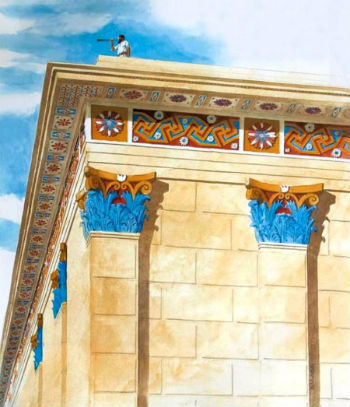 One report says James, the brother of Jesus, was thrown from this pinnacle of the Temple in 62 AD. Perhaps the background for the serious nature of the Hebrews letter.
One report says James, the brother of Jesus, was thrown from this pinnacle of the Temple in 62 AD. Perhaps the background for the serious nature of the Hebrews letter.
One peculiar feature of St. Paul’s letters is no matter how high-flying the theology he typically comes back to practical issues of Christian living.
The Letter to the Hebrews is no exception. Here is an impassioned document that warns Jewish Christians not to return to Old Covenant worship patterns that had already been fulfilled in Christ. As we have been showing, he begins the letter that takes us “from there to eternity” by reestablishing in their minds the superiority of Jesus. Jesus is superior to creation (Hebrews 1:1-2; 3:4), to angels (1:5), to Moses (3:3), to Abraham by his assuming the mantle of the Melchizedek priesthood (7:4), and to Joshua and David (4:7-9), the Law (7:14-15) the temple ritual (9:12) and all the heroes of old (11:39-40).
We’ve been showing that “better” is a key word in Hebrews – better promises, better priesthood, better resurrection.
The Church under Pressure
Hebrews 13 is in that vein but Hebrews 12:25-29 sets up this last chapter by exhorting the Hebrews one last time to not listen to the voices calling them back to Judaism. We cannot know precisely the reasons for this pressure – it may be the hothouse atmosphere inside Jerusalem in the 60s AD which exploded in the disastrous Jewish revolt of 66-73 AD. Or maybe in connection with that, the death of their leader James in 62 AD. Or the pressure to conform as radical Jewish extremists took over the running of the city and the temple. There are certain references that show rough times could be ahead (Hebrews 12:4).
The main thing was Paul’s pointed reminder that if the people who promised to obey the first covenant at Sinai did not escape retribution what will happen to those who ignore God’s ample warnings from heaven and who now lightly esteem Christ’s sacrifice. This would be to “insult the Holy Spirit” as he has already explained (10:29), a most dire offense. Hence the reminder that God is a consuming fire in Hebrews 12:29 though fire is also used in the New Testament as a purging mechanism. So even here there may be the offer of holding out a chance of repentance to those who are still wavering (Mark 9:49, Luke 3:16).
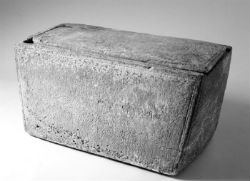 Are James' remains in here? Recent discovery of this bone box in Jerusalem has sparked controversy.
Are James' remains in here? Recent discovery of this bone box in Jerusalem has sparked controversy.A New Christian Ethic
This sets up Hebrews 13 – practical Christian living as a basis for Christian ethic, a value system that eventually changed the world as the Roman Empire rotted away.
Hebrews 13:1-4 opens with the supreme Christian virtue of brotherly love. It seems that some Hebrew Christians were being thrown into prison and otherwise mistreated. If so this was only a foretaste of the punishment that would fall on the fanatics in the city of Jerusalem for the death of James the Just, the Lord’s brother and a man arrested by the priesthood during the change in Roman governors in 62 AD. One report says James was thrown from the pinnacle of the temple. The word “Love” in our day has been so overused and watered down as to be almost meaningless but a love expressed in concrete terms as ongoing hospitality and prison ministry is love in action, which the Bible enjoins.
This section ends with some of the most encouraging statements in Scripture – God’s promise not to leave us or forsake us, a promise that harassed Christians in Jerusalem might soon have to claim as they carried out the flight from the doomed city Jesus had already condemned (Matthew 24:15-42; Luke 23:28-30).
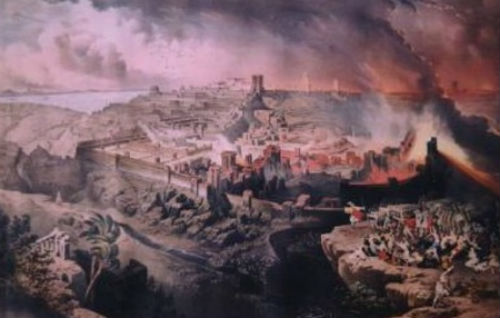 Romans burn the temple in 70 AD as Jesus had predicted (Matthew 24:2). Not trusting the temple is a prime but indirect message in Hebrews.
Romans burn the temple in 70 AD as Jesus had predicted (Matthew 24:2). Not trusting the temple is a prime but indirect message in Hebrews.Unity vs. Heresy
Hebrews 13 carries on with various scattered injunctions to obey the church leadership – crucial if the religious fanatics were trying to pressure the believers from their allegiance. The phrase to “imitate their faith” regarding their leaders could be a veiled reference to the martyrdom of James already alluded to.
There is a warning about overemphasizing adherence to exotic food laws which may or may not be the Jewish regulations of Leviticus 11. Jews were famous for three things in the First Century – circumcision, Sabbaths and food laws. Circumcision was by far the most important as a physical sign of entrance into the congregation of Israel. As Jesus explained the proof was that a child could be circumcised on Saturdays if necessary (John 7:23). Paul had already explained that the true Sabbath rest pointed to the heavenly rest and that was most important to the Christian believers and those who heard Paul preach (Hebrews 4:9).
The True Sin Offering
In Hebrews 13:11-14 Paul reminds his Jewish hearers of the lesson in the sin offering. In the ancient Israelite sacrificial system, the sin offering was killed at the altar but burned “outside the camp” (Leviticus 4:21; 16:27). Paul makes this point for one last explanation of how Jesus fulfilled the Law of the sacrifices. His readers knew that Jesus was crucified outside the gates of Jerusalem (John 19:20). There – says Paul – finishing his argument – we are to go and symbolically meet him. This may again be a warning for believers to escape the destruction that is coming but even more so to bear the reproach and persecution the Christian life often entails.
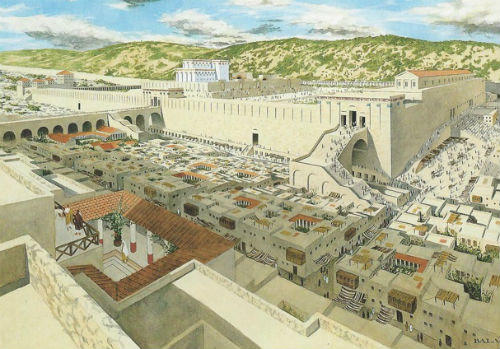 Reconstruction of the impressive Herod's Temple of Jesus'day. No wonder Jewish worshippers felt secure. Even the early church met there.
Reconstruction of the impressive Herod's Temple of Jesus'day. No wonder Jewish worshippers felt secure. Even the early church met there.As Donald Guthrie explains: “The verb ‘let us go forth’ involves a definite break which is reinforced by the words ‘outside the camp.’ Such an act involves separation from the existing society of Judaism…It was part of the offence of the cross that it brought with it a rejection from official Judaism…these Jewish readers are being invited to leave their Jewish faith and identify with Jesus” (Hebrews, page 274.
To those Jewish zealots who taunted the Christians that they have no altar of sacrifice, Paul says Jesus is our altar (Hebrews 13:10). Our sacrifices are to be praise and confession and service to others. We are to obey Jesus in giving food and sharing with others as an ongoing part of our Christian life and witness (Hebrews 13:15-16). Thus the Hebrews letter once again lays down the direction Christian living will take. There is a lovely Christian report of legend of St. Martin of Tours from the 300s AD who cut his cape in half to share with a distraught beggar. Later Jesus appeared to him in a dream clothed in half a cape saying “I was that beggar” and reciting Matthew 25:40.
Christian sharing? Their skill at looking after the poor did much to prepare the soil for the Roman Empire to become officially Christian in 381 AD. Think of Christian food banks today and the Methodist free dispensaries in 1700s London. Or think of the everyday work of the Salvation Army. In the 60s AD Paul is giving his readers every inducement to leave the doomed city of Jerusalem but carefully so as not to be offensive as so many of his hearers are entrenched in the Old Covenant and all its impressive accoutrements.
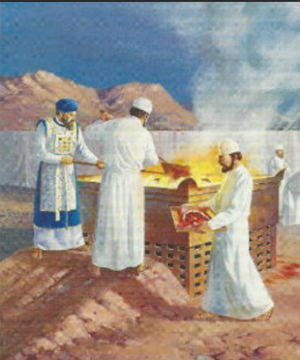 The Old Testament sacrifices pointed to forgiveness for all.
The Old Testament sacrifices pointed to forgiveness for all.The Benediction
The letter ends with one of the most beautiful benedictions in Scripture, full of meaning and delight (Hebrews 13:20-21). It begins with the God of Peace. The God of peace makes us at peace with ourselves and with others because His peace is a gift from God (“charisma” in the Greek) and that peace is infused to us straight from the Father and the Son through the ministry of the Holy Spirit which gently floods our minds when we petition him for it (Philippians 4:5-6). Paul cannot finish without the remembrance of the work done for us by Jesus, “that great Shepherd of the sheep,” who lives on in heaven directing his flock and equipping us for the work he has given us to do in this world.
And so this great letter brings the First Century message right down to us. As Paul says, “may he work in us what is pleasing to him, through Jesus Christ” (13:21). And on that note we are brought back from the God of creation in Hebrews 1:1-2 to the work at hand, whether we be Hebrews or not. So be it. Let us bend our shoulders to the task knowing that the mission and the calling are as yet unfinished but are His and His alone to this dark world.